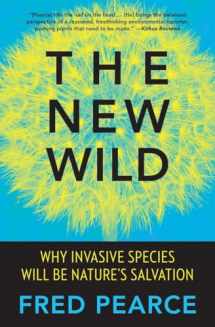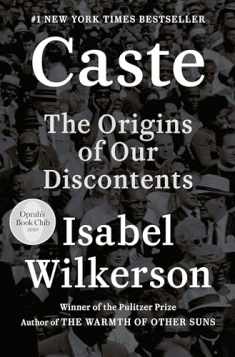
The New Wild: Why Invasive Species Will Be Nature's Salvation
ISBN-13:
9780807039557
ISBN-10:
0807039551
Edition:
Reprint
Author:
Fred Pearce
Publication date:
2016
Publisher:
Beacon Press
Format:
Paperback
264 pages
Category:
Animals
,
Conservation
,
Nature & Ecology
,
Ecosystems
,
Endangered Species
,
Biological Sciences
FREE US shipping
on ALL non-marketplace orders
Marketplace
from $16.96
USD
Marketplace offers
Seller
Condition
Note
Seller
Condition
New
Brand New! Not overstocks! Brand New direct from the publisher! Ships in sturdy cardboard packaging.
Book details
ISBN-13:
9780807039557
ISBN-10:
0807039551
Edition:
Reprint
Author:
Fred Pearce
Publication date:
2016
Publisher:
Beacon Press
Format:
Paperback
264 pages
Category:
Animals
,
Conservation
,
Nature & Ecology
,
Ecosystems
,
Endangered Species
,
Biological Sciences
Summary
The New Wild: Why Invasive Species Will Be Nature's Salvation (ISBN-13: 9780807039557 and ISBN-10: 0807039551), written by authors
Fred Pearce, was published by Beacon Press in 2016.
With an overall rating of 3.6 stars, it's a notable title among other
Animals
(Conservation, Nature & Ecology, Ecosystems, Endangered Species, Biological Sciences) books. You can easily purchase or rent The New Wild: Why Invasive Species Will Be Nature's Salvation (Paperback) from BooksRun,
along with many other new and used
Animals
books
and textbooks.
And, if you're looking to sell your copy, our current buyback offer is $4.43.
Description
Named one of the best books of 2015 by The Economist
A provocative exploration of the “new ecology” and why most of what we think we know about alien species is wrong
For a long time, veteran environmental journalist Fred Pearce thought in stark terms about invasive species: they were the evil interlopers spoiling pristine “natural” ecosystems. Most conservationists and environmentalists share this view. But what if the traditional view of ecology is wrong—what if true environmentalists should be applauding the invaders?
In The New Wild, Pearce goes on a journey across six continents to rediscover what conservation in the twenty-first century should be about. Pearce explores ecosystems from remote Pacific islands to the United Kingdom, from San Francisco Bay to the Great Lakes, as he digs into questionable estimates of the cost of invader species and reveals the outdated intellectual sources of our ideas about the balance of nature. Pearce acknowledges that there are horror stories about alien species disrupting ecosystems, but most of the time, the tens of thousands of introduced species usually swiftly die out or settle down and become model eco-citizens. The case for keeping out alien species, he finds, looks increasingly flawed.
As Pearce argues, mainstream environmentalists are right that we need a rewilding of the earth, but they are wrong if they imagine that we can achieve that by reengineering ecosystems. Humans have changed the planet too much, and nature never goes backward. But a growing group of scientists is taking a fresh look at how species interact in the wild. According to these new ecologists, we should applaud the dynamism of alien species and the novel ecosystems they create.
In an era of climate change and widespread ecological damage, it is absolutely crucial that we find ways to help nature regenerate. Embracing the new ecology, Pearce shows us, is our best chance. To be an environmentalist in the twenty-first century means celebrating nature’s wildness and capacity for change.
A provocative exploration of the “new ecology” and why most of what we think we know about alien species is wrong
For a long time, veteran environmental journalist Fred Pearce thought in stark terms about invasive species: they were the evil interlopers spoiling pristine “natural” ecosystems. Most conservationists and environmentalists share this view. But what if the traditional view of ecology is wrong—what if true environmentalists should be applauding the invaders?
In The New Wild, Pearce goes on a journey across six continents to rediscover what conservation in the twenty-first century should be about. Pearce explores ecosystems from remote Pacific islands to the United Kingdom, from San Francisco Bay to the Great Lakes, as he digs into questionable estimates of the cost of invader species and reveals the outdated intellectual sources of our ideas about the balance of nature. Pearce acknowledges that there are horror stories about alien species disrupting ecosystems, but most of the time, the tens of thousands of introduced species usually swiftly die out or settle down and become model eco-citizens. The case for keeping out alien species, he finds, looks increasingly flawed.
As Pearce argues, mainstream environmentalists are right that we need a rewilding of the earth, but they are wrong if they imagine that we can achieve that by reengineering ecosystems. Humans have changed the planet too much, and nature never goes backward. But a growing group of scientists is taking a fresh look at how species interact in the wild. According to these new ecologists, we should applaud the dynamism of alien species and the novel ecosystems they create.
In an era of climate change and widespread ecological damage, it is absolutely crucial that we find ways to help nature regenerate. Embracing the new ecology, Pearce shows us, is our best chance. To be an environmentalist in the twenty-first century means celebrating nature’s wildness and capacity for change.


We would LOVE it if you could help us and other readers by reviewing the book
Book review

Congratulations! We have received your book review.
{user}
{createdAt}
by {truncated_author}




